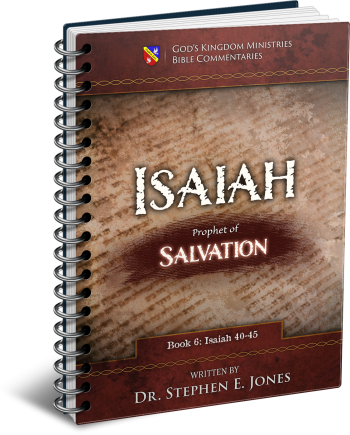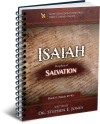Latest Posts
View the latest posts in an easy-to-read list format, with filtering options.

Isaiah is the prophet of Salvation. He is also known as the truly "Universalist" prophet, by which is meant that He makes it clear that salvation is extended equally to all nations and not just to Israel. He lived to see the fall of Israel and the deportation of the Israelites to Assyria, and he prophesied of their "return" to God (through repentance). He is truly a "major prophet" whose prophecies greatly influenced the Apostle Paul in the New Testament.
Category - Bible Commentaries

After speaking directly to the idolaters who had lost their case in the divine court, God then turns to the witnesses on the winning side. These are the ones who are “justified.” God gives them comfort and joy. Isaiah 44:21, 22 says,
21 Remember these things, O Jacob, and Israel, for you are My servant; I have formed you, you are My servant, O Israel, you will not be forgotten by Me. 22 I have wiped out your transgressions like a thick cloud and your sins like a heavy mist; return to Me, for I have redeemed you.
These verses are based directly on the law of redeemed servants. The very need for redemption implies that Israel had been sold as a slave to a foreigner on account of a debt that he could not pay (Exodus 22:3; Lev. 25:47). In such cases, a kinsman has the right of redemption. Jesus was born of the seed of Israel, specifically of Judah, so that the foreign taskmaster would not have the right to refuse Him as long as He had the means to pay the slave’s debt.
The slave in this case was Israel, who had incurred an unpayable debt through sin and had been sold into bondage to Assyria, the foreigner. The messianic promises in Isaiah and in other places were fulfilled through Jesus Christ. One of His main responsibilities as a kinsman was to redeem Israel. He paid the price on the cross. His blood was found sufficient, not only for the sin of Israel but also for the sin of the whole world (1 John 2:2).
The price of any slave that is sold on account of his debt is the debt itself. If a slave owes $100, then that is the redemption price. If a slave owes a billion dollars, then that is what it takes to redeem him. Israel was hopelessly indebted, but Jesus’ blood was worth far more than the incurred debt—so much more, in fact, that He was able to purchase the whole world with it (1 John 2:2). So He did.
Think of it this way. A man takes a bar of gold to the grocery store to purchase bread. At the checkout counter, he is told that the loaves of bread cost $10. “All I have is this gold bar,” the man replies. “I have no smaller currency to pay for the bread. That is far too much for this bread, so I will just buy the entire store.”
This was how God “wiped out your transgressions.” He did it the lawful way according to the redemption laws. Since He had already sold Israel into the hands of a foreigner (Assyria), He could not lawfully lay claim to Israel without payment. Neither could He simply forgive Israel’s sin without satisfying the law. That is why He came to give His life as payment for the sin of the world. He satisfied the law; He did not put away the law.
Lev. 25:53-55 says that a redeemed kinsman becomes the servant of his redeemer and must work for him until the debt is paid or until the year of Jubilee.
53 Like a man hired year by year he shall be with him; he shall not rule over him with severity in your sight. 54 Even if he is not redeemed by these means, he shall still go out in the year of Jubilee, he and his sons with him. 55 For the sons of Israel are My servants; they are My servants whom I brought out from the land of Egypt. I am the Lord your God.
A redeemed servant is not allowed to be lawless but must obey the commands and laws of his redeemer. He has changed masters but remains a servant. Hence, Paul says in Rom. 6:17, 18,
17 But thanks be to God that though you were slaves of sin, you became obedient from the heart to that form of teaching to which you were committed, 18 and having been freed from sin, you became slaves of righteousness.
For this reason, Paul calls himself “a bond-servant of Christ Jesus” (Rom. 1:1). He was not free to sin but was freed from the former slave-master personified as Sin, allowing him to follow the law of God rather than the law of Sin (Rom. 7:22, 25).
Paul was greatly influence by Isaiah, as evidenced by his many quotations in his epistle to the saints in Rome. Isaiah and Paul should be interpreted in light of each other’s writings. Isaiah 44:21, 22, in turn must be seen in the light of the redemption laws in Leviticus 25, seeing that God describes himself as Israel’s Redeemer.
When an oppressed slave is redeemed by a near kinsman who loves him and will treat him with kindness, he has reason to rejoice. Heb. 2:16 tells us that Christ came of the seed of Abraham to redeem the near kinsmen of Israel. But the benefits go far beyond Israel’s redemption. It extends to the entire world, because God intends to put all things under the feet of Christ.
For this reason, the near-kinsman law applies not only to Israel but to humanity as a whole. This is explained in Heb. 2:14, 15,
14 Therefore, since the children share in flesh and blood, He Himself likewise also partook of the same, that through death He might render powerless him who had the power of death, that is, the devil, 15 and might free those who through fear of death were subject to slavery all their lives.
In other words, the “children” are more than just the children of Israel. God’s children are all who “share in flesh and blood.” This applies the law of redemption on a deeper level going all the way back to Adam, who was made a living soul with flesh and blood. Hence, Jesus Christ did not take upon Himself the nature of angels (spirit only) but came in flesh and blood so that He might be a near-kinsman to all who have flesh and blood.
For this reason, Isaiah 44:23 says,
23 Shout for joy, O heavens, for the Lord has done it! Shout joyfully, you lower parts of the earth; break forth into a shout of joy, you mountains, O forest, and every tree in it; for the Lord has redeemed Jacob, and in Israel He shows forth His glory.
Isaiah distinguishes between the “heavens” and the “lower parts of the earth” as well as the “mountains” and “forest” on the earth itself (including “every tree”). So also, Paul tells us in Phil. 2:10,
10 so that at the name of Jesus every knee will bow, of those who are in heaven and on earth and under the earth.
These three categories of creation, in the writings of both Paul and Isaiah, encompass the whole universe. For this reason, Paul concludes that the entire universe will be reconciled to God in the end, and this is how we ought to interpret Isaiah 44:23 as well. When the entire universe is in a state of rejoicing, there will be no more bondage or oppression, no more pain or sorrow.
Revelation 21:4, 5 adds,
4 and He will wipe away every tear from their eyes; and there will no longer be any death; there will no longer be any mourning, or crying, or pain; the first things have passed away. 5 And He who sits on the throne says, “Behold, I am making all things new.”
This is the “new” thing that Isaiah mentioned earlier in Isaiah 43:19. Everyone will rejoice when the old order is replaced, for we read in Isaiah 44:23, “in Israel He shows forth His glory.” While this is a reference to the story of Jacob’s wrestling match with the angel, and where God’s glory was to give him a new nature/name, “Israel,” the entire world benefits. For this reason, God swore an oath to Moses in Num. 14:21,
21 but indeed, as I live, all the earth will be filled with the glory of the Lord.
So we find that from the time that Solomon laid the foundation of the temple (967 B.C.) until Jesus received glory at His death and resurrection (33 A.D.) was a thousand years. A thousand is the biblical number of glory. For this reason, Jesus prayed in John 17:4, 5,
4 “I glorified You on the earth, having accomplished the work which You have given Me to do. 5 Now, Father, glorify Me together with Yourself with the glory which I had with You before the world was.”
Jesus was the first to be fully glorified as the Head of all things. The overcomers will be glorified at the first resurrection, followed by the church at the general resurrection a thousand years later. Finally, all of creation will receive His glory at the final Jubilee, when all who are yet enslaved will be set free by law of grace (Lev. 25:54).